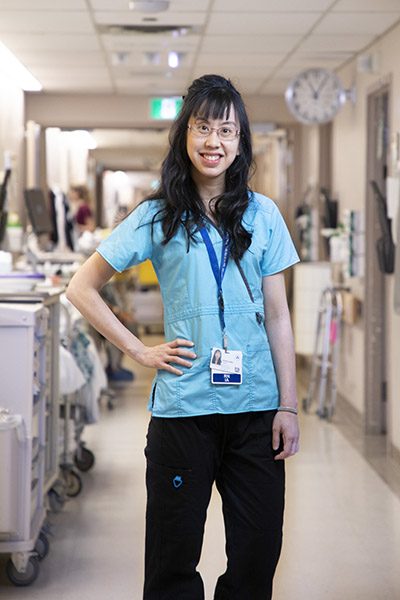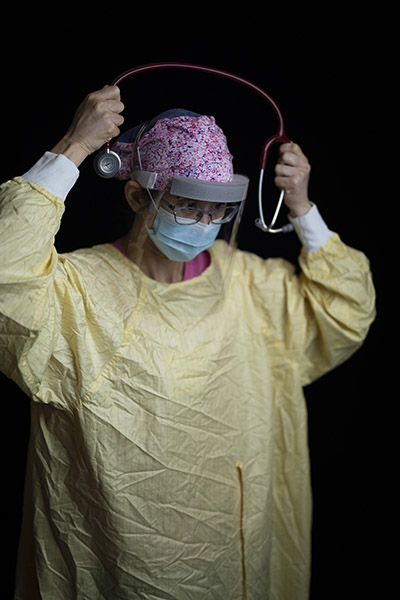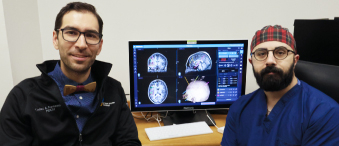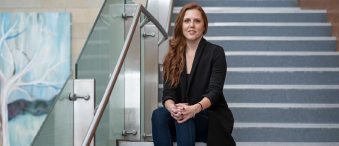Jeannette Cheng shares the story of the traumatic motor vehicle collision — and the subsequent care she received — that changed the course of her life and inspired her to become a healthcare worker. Here is Jeannette’s story in her own words.
On August 18, 2007, after a night out with a group of fellow fourth-year Information Technology students from Carleton University, I struggled to fall asleep. I was eager and excited about the white-water rafting trip we had planned for the next day. I did manage to fall asleep eventually, but the next thing I remember was waking up in The Ottawa Hospital’s Intensive Care Unit two weeks later.
Amid my confusion, my caring and empathetic nurse explained I had been in a collision. She told me our car had been T-boned by an oncoming truck on the way to white-water rafting. I didn’t remember a thing about that morning, but apparently, I had been sitting in the back middle seat, where there was only a lap belt for protection, and I sustained life-threatening injuries that required me to be airlifted to the only adult Level 1 Trauma Centre in eastern Ontario — at The Ottawa Hospital.
I was in bad shape when I arrived. I had emergency surgeries to remove my spleen, a craniotomy to repair my fractured skull, and another surgery to stabilize my pelvis. I had chest tubes inserted because my lungs had collapsed, a tracheostomy to help me breathe, and an abdominal abscess removed.
Compassionate care during a terrifying time
I spent one month in the ICU before being moved to the trauma unit, where I experienced an upper gastrointestinal bleed. This was extremely serious, and I was terrified. But when my attending physician, Dr. Giuseppe Pagliarello, came to see me I experienced an inspiring, life-changing moment.
Dr. Pagliarello came to my bedside, held my hand, and spoke clearly and confidently about the next steps for my care. I was taken with his compassion, and that small gesture of holding my hand showed me I wasn’t alone. It was his kindness in that critical moment that inspired me to pursue a career in healthcare.
“I was taken with his compassion, and that small gesture of holding my hand showed me I wasn’t alone. It was his kindness in that critical moment that inspired me to pursue a career in healthcare.”
– Jeannette Cheng
Months of rehabilitations and recovery
Still, my road to recovery was far from over. After spending two weeks in the trauma unit, I spent another two weeks in the general surgery unit before going to The Ottawa Hospital’s Rehabilitation Centre. Over the course of two months, I relearned basic skills, including how to feed myself, talk, and walk again.
Throughout my time at The Ottawa Hospital, I received support from countless physicians, nurses, physiotherapists, occupational therapists, speech therapists, and more. These people were unbelievably dedicated, compassionate, and patient.
I left the hospital after four long months with a new appreciation for all the little things we take for granted, like being able to walk without assistance. I also had a deep sense of gratitude for the exceptional care I received when my life was on the line, and I had a newfound desire to provide that same care to others.
A new calling
When I was able, I returned to complete my final school year in Information Technology, but that desire to care for others didn’t go away. So, I made a transition towards healthcare by returning to school to become a Registered Nurse. And in April 2018, I began working at The Ottawa Hospital – in the very same trauma unit that saved my life. Now, I’m able to provide the same kind of compassionate care to patients that I received more than a decade prior. Being able to share my story with some of my trauma patients has shown them that they, too, are not alone in their recovery process.
“The motor vehicle collision was a life-changing experience that has directed my path to continue to make a difference in my community.”
– Jeannette Cheng
When I made the decision to become an RN, I never imagined I’d end up caring for people during a global health crisis, but that’s precisely what happened. At the height of the pandemic, my floor became a designated COVID-19 unit. It was extremely challenging to see so many patients suffering from COVID while not being able to see their loved ones, but it was also a privilege to be able to care for them.

The motor vehicle collision was a life-changing experience that has directed my path to continue making a difference in my community.

Working with trauma patients, as well as COVID patients, allowed me to do that.
Being a nurse has taught me how important it is to have hope while also accepting the unpredictability of life. And my story is a reminder of the impact compassionate care can have on someone. It’s a reminder that something as simple as holding a person’s hand in their moment of need can change their life forever.
Download episode #50 of Pulse Podcast to hear Jeannette Cheng’s story.




